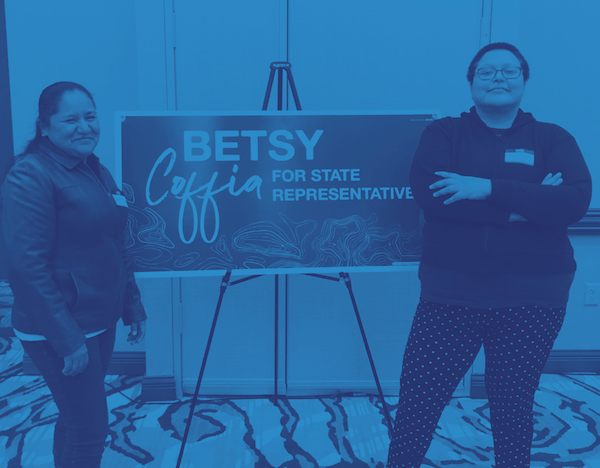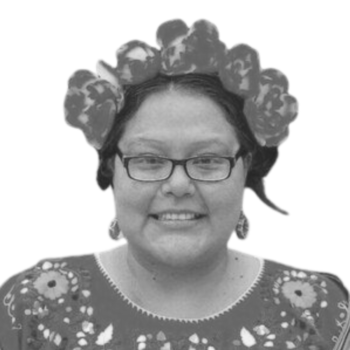In a crowded living room at King’s Court Mobile Home Park in Traverse City, MI, Blanca and Julio gathered a group of their friends and family for dinner and a conversation about winning back drivers’ licenses. As more people slowly trickled in after their shifts at restaurants and the local cherry farms, they explained the history of how driver’s licenses were taken away in Michigan by a Republican-controlled legislature in 2008. The group was deeply unsettled to learn that the representative for their district, Republican Jack O’Malley, had outright opposed driver’s licenses for undocumented immigrants. As chair of the Transportation Committee in 2019, he had refused so much as to give the “Drive SAFE” bills a hearing. The frustration and indignation in the room was palpable, but so was the burning desire to remove him from office.
Over the next couple of months, Blanca and Julio would host a series of house meetings, community events, and voter registration drives alongside other rural, undocumented farmworkers. The urgency of restoring licenses—and anger at anti-immigrant policies—drove the organizing that helped Democrats take control of all three branches of state government.
Long fight for licenses
The fight for driver’s licenses in Michigan goes back five years. The movement started with undocumented workers and community members in Movimiento Cosecha who were tired of living without this basic form of identification and protection against deportation. Driving without a driver’s license remains the top cause for deportation of undocumented immigrants in the state of Michigan, resulting in hundreds of deportations and family separations.
The Drive Michigan Forward coalition formed in 2019, drawing together a number of organizations across the state committed to restoring driver’s license access, including We The People Michigan, Michigan Immigrant Rights Center, and the ACLU of Michigan, among others. The coalition worked to get the “Drive SAFE” package of legislation introduced in both 2019 and 2021. However, due to a Republican majority in both chambers, the bills have never been voted out of committee or even had a hearing. Heading into the midterm election of 2022, it was evident that a new strategy was necessary—one that could organize and mobilize Spanish-speaking immigrant communities in ways that only undocumented people would know how to do.
To build the leadership to carry out this strategy, We the People Michigan developed a program called Migrant Leader School to train people on forming local organizing teams across the state equipped to fight for driver’s licenses. The participants in this program were already leaders in their own right, evidenced by their active roles in their church communities, jobs, and at their children’s schools. Two of those leaders were Blanca and her family friend Julio; they joined eight other leaders located in areas across the state, from cities like Detroit, Ypsilanti, Grand Rapids, and Kalamazoo, to rural areas in Traverse City, St. Joseph, and Hartford in northern and southwest Michigan. Each team developed a strategy that was specific to their community and applied pressure on their elected officials.
Organizing in the North: Grand Traverse County
Once Blanca and Julio learned that a Democrat, Betsy Coffia, was running in the 103rd district to replace the Republican incumbent and main opponent to the Drive SAFE bills, their strategy was obvious. In 18 out of the 19 states that had won driver’s licenses for undocumented residents, Democrats have had a trifecta: a Democratic governor and majorities in both houses of the legislature. Flipping this district would be instrumental for changing the playing field and creating a pathway for the Drive SAFE bills to finally become law.
Despite being unable to vote, undocumented leaders in the Grand Traverse area decided that they would not sit idly by and wait for change to happen. Instead, they organized themselves and their families, using tactics and cultural knowledge that was specific to the Latinx, immigrant communities they were experts at navigating. They organized meetings at night in people’s homes, aware that after working 12 hour days in the cherry fields and apple orchards, it was easier for people to gather in a place where they were comfortable. Working with mixed-status families, they encouraged undocumented members of the community to compile lists of eligible voters in their network and urge them to vote, including their children, grandchildren, neighbors, or members of their church.
Despite working four jobs—as a farmworker, housekeeper, landscaper, line cook at a French restaurant, and a pan dulce vendor on the weekends—and raising three kids as a single mother, Blanca gave every nonexistent free second of her time to this campaign. In the parking lot of Meijer’s, where she sets up shop to distribute her pan dulce orders, she filled each bag with information in Spanish about how to register to vote, find polling locations, or request a ride on Election Day. Using a hotspot due to poor connectivity, we checked if every person that arrived had already registered to vote or would commit to calling an eligible voter and passing them the information.
Between jobs, English classes, church, and her endless responsibilities as a single mother, she made countless calls to ensure people had rides to the polls or were checking in on their citizen relatives to make sure they had a voting plan.
Betsy Coffia won the 103rd district by just over 700 votes.
Organizing the South: St. Joseph County
Inspired by the work being done in Traverse City, a participant in the Migrant Leader School from St. Joseph named Paty began organizing her community in the competitive open seat for the 38th House District.
As the owner of a restaurant in St. Joseph, Paty closed early every Tuesday in order to host community meetings and register families to vote. Paty recruited her entire family to help distribute information on voter registration at restaurants, grocery stores, churches, and greenhouses.
Through WhatsApp group chats and texts to Latinx, immigrant families across the district, they spread the importance of electing Joey Andrews, a Democrat who had committed to fight for driver’s licenses if elected. When Paty encountered someone unable to vote due to their immigration status, she immediately asked them who they knew who could vote, and if they could give them a call. Many of the people contacted had never voted or engaged in the political process, but they were committed to taking action if it meant restoring driver’s licenses for their loved ones.
Joey Andrews won the 38th district by 1,505 votes.
Risking it all to flip the statehouse
It is because of undocumented leaders risking it all—quite literally risking deportation while driving great distances across large rural areas without a driver’s license in order to provide rides to the polls—that Michigan now has a fighting chance to improve the living conditions of all Michiganders. Betsy Coffia won the 103rd House district by 765 votes, winning precincts in rural, immigrant areas that had never been won by a Democrat.
There are now two representatives heading to Lansing, put into power by the organizing efforts of undocumented immigrants, who have committed to fighting for driver’s licenses on day one. Through sustained, long-term organizing in rural communities, undocumented folks in Michigan are demonstrating that we ultimately wield the power to effect change and can use elections as a powerful tool in winning campaigns for our rights.
The electoral organizing of undocumented Michiganders tipped the scale of power in the 38th and 103rd districts, providing Democrats with a slim, one-seat majority in the House, flipping the seats that flipped the legislature.
Among the unsung heroes of the Democrats’ historic triumph in the Michigan legislature are the same unsung heroes that have kept our country fed for generations: rural, undocumented farmworkers and their families. The first Michigan Democratic trifecta in 40 years was hand-delivered by the calloused hands of undocumented organizers across northern and southwest rural communities.


